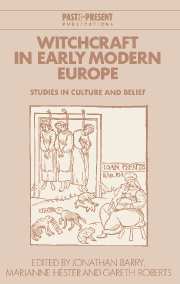1 - Introduction: Keith Thomas and the problem of witchcraft
Published online by Cambridge University Press: 06 July 2010
Summary
Few historical enterprises have been as intensively historiographical and reflexive in character as the study of witchcraft in early modern Europe. Doubts about the very existence, let alone the character, of the object of study, together with the interdisciplinary nature of the subject, have ensured that the explosion of studies in this field since the 1960s has been accompanied by a regular rethinking of its intellectual parameters and conceptual tools. One of the most important moments in this process was the publication in 1971 of Religion and the Decline of Magic by Keith Thomas. The essays in this book, arising from a conference held in 1991, examine the developments in witchcraft scholarship in the last two decades or so in the light of Thomas' contribution. In part a review of his influence, it also offers both prescriptions and examples for alternative approaches. This introduction begins this process by re-examining the arguments of Religion and the Decline of Magic in the light of subsequent studies (particularly, but not exclusively, in the Englishspeaking world), as a way of exploring the changing nature of witchcraft research.
Like any reception study, this chapter will chart an uneasy course between analysis of what Thomas himself was arguing and what has been read into his work. Religion and the Decline of Magic is a large and complex work, in which witchcraft is only one theme.
- Type
- Chapter
- Information
- Witchcraft in Early Modern EuropeStudies in Culture and Belief, pp. 1 - 46Publisher: Cambridge University PressPrint publication year: 1996
- 14
- Cited by

